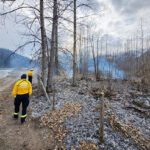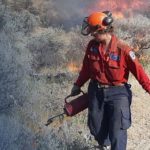Home »

Local continues to be agricultural leader
Farmer Profile: Peter Trescher, Brisco Enterprises
By Tracey Fredrickson
The communities of Brisco, Edgewater and Spillimacheen in the East Kootenay may be populated by under 1,000 people, but the area is steeped in agricultural history.
Peter Trescher has been part of that history his entire life, having been raised on the 1,000- acre Brisco property purchased by his parents Hedi and Alfred Trescher in 1962.
From the time he was active in 4H as a youngster to his years studying livestock production at Olds College and eventually going into partnership with his parents, farming was Peter’s calling, and he continues to operate the farm with Hedi today.
Peter describes himself as an “environmental farmer” something he says “almost sounds contrary to raising beef cattle in this day and age.”
He sat on the BC Cattlemen’s Association’s Environmental Committee for many years and has participated in the Verified Beef Production Plus program, and the Environmental Farm Plan.
A dedicated recycler, if there are volunteers out collecting litter at the side of the highway, he will likely be among them.
Both Peter and Hedi are known for their work with Windermere District Farmers’ Institute where Peter has been secretary for almost 30 years, and Hedi is Project Coordinator. In this role she helped champion the development of the Institute’s micro-abattoir that opened in 2017.
Looking at how his parents got into farming and new farmers come into the industry today, Peter says his parents learned farming in the Kootenays was very different to Alfred’s experience in Europe and many lessons were learned along the way. But what started with 40 cows evolved into Brisco Charolais which produced purebred Charolais bulls for four decades. Some of the original property was sold to a wetlands trust over the years and Peter now runs 75 cows and grows hay on about 750 acres as Brisco Enterprises.
“Access to land is the greatest challenge for new farmers wanting to get into the industry,” Peter says.
“There are fewer cow/calf operations and more market gardens. I think this is a reflection of what today’s consumers are buying and a renewed respect for our food supply. There’s a wonderful energy around farmers’ markets and they are an important source of sales for many producers. In fact, money is being made from well-run farms of all kinds and there are more resources available to help farmers manage their businesses effectively.”
Even when backpacking in remote areas of the world, something he does every year, Peter is sensitive to trends in farming.
“Despite the number of abandoned farm buildings in places like Spain there are always some that are being revitalized,” he said. “The technology available today supports the movement to more rural living while maintaining access to the amenities of larger centres. Technology also helps connect us to the resources that help us farm better such as programs through the Ministry of Agriculture and Columbia Basin Trust. “Today’s younger farmers will do the work just as well as we did,” he said.
Tracey Fredrickson is an Agriculture Specialist with Basin Business Advisors
Kootenay & Boundary Farm Advisors







